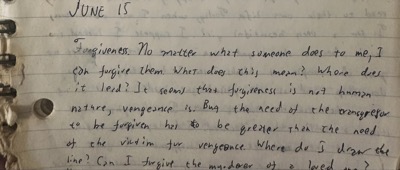 A bit of context on these journal entries, I suppose. This was the summer between my sophomore and junior year of college. I had a job working at the University of Illinois at Chicago computer center. I forget what I was doing that year, although if I remember correctly, I was working in the Medical Center campus that year instead of the Circle campus which was the main academic campus (the Medical Center, unsurprisingly, hosted the UIC hospital facilities and its medical school, but also was where the university had its mainframe in the basement of the Goldberg Research Center). My tenuous hold on my days in nerd school was beginning to slip (I was still a Math-English double major at this time and I have a vague memory of intending to teach myself abstract algebra over the summer to be able to skip that class when I returned to campus in the fall. This did not happen).
A bit of context on these journal entries, I suppose. This was the summer between my sophomore and junior year of college. I had a job working at the University of Illinois at Chicago computer center. I forget what I was doing that year, although if I remember correctly, I was working in the Medical Center campus that year instead of the Circle campus which was the main academic campus (the Medical Center, unsurprisingly, hosted the UIC hospital facilities and its medical school, but also was where the university had its mainframe in the basement of the Goldberg Research Center). My tenuous hold on my days in nerd school was beginning to slip (I was still a Math-English double major at this time and I have a vague memory of intending to teach myself abstract algebra over the summer to be able to skip that class when I returned to campus in the fall. This did not happen).
And in that context, I wrote:
Forgiveness. No matter what someone does to me, I can forgive them. What does this mean? Where does it lead? It seems that forgiveness is not human nature, vengeance is. But the need of the transgressor to be forgiven has to be greater than the need of the victim for vengeance. Where do I draw the line? Can I forgive the murderer of a loved one?
At this point in my life, I identified myself as an agnostic. I had approached the Bible primarily from a context of its usefulness for understanding literary allusions, and I think all I’d really read of it was Genesis and Matthew if even that. And yet I was able to take a radical stance on forgiveness at this stage of my life. This feels like I’d rather enthusiastically adopted the Sermon on the Mount.
Some years later, I remember thinking (maybe even writing) that I was so willing to forgive because I was so much in need of forgiveness myself. It’s a little disconcerting to see this sentiment so early in my life.
And dig me, managing to be consistent enough to write journal entries on two consecutive days. I’m pretty sure that this does not last.
Leave a Reply